Tiger Brokers How to Buy U.S. Stocks and Exchange Currencies
This article collates Tiger Brokers orders to buy U.S. stocks, ETF process, pending orders, set stop loss and currency exchange details.。Investing in U.S. stocks is the same as investing in the best companies in the world!
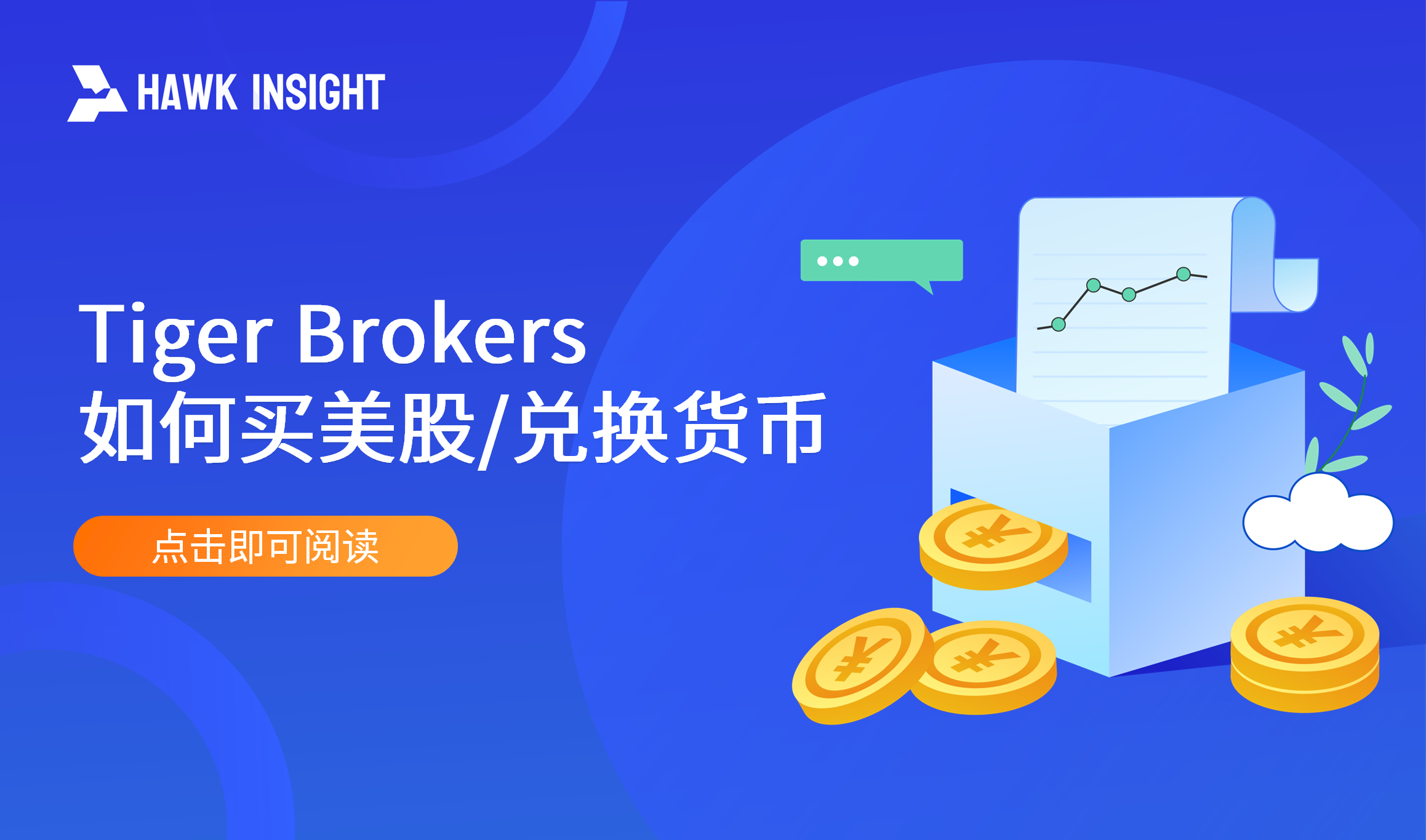
If you want to participate in investing in U.S., Hong Kong, Singapore stocks and ETFs, or financial derivatives such as options and futures, it is easier and more convenient to place orders through overseas brokerage firms.。This article for you to organize the Hong Kong and U.S. stock brokerage - Tiger Securities Tiger Brokers order to buy stocks, ETF process, Tiger Securities to provide what order methods, currency exchange details, you can independently complete all the trading procedures。
Tiger Securities is a technology-based securities dealer with companies in Singapore, Beijing, New York and other cities, and has obtained brokerage licenses or licenses in Singapore, the United States, New Zealand, Australia and other places.。
One of its advantages is that users can use an account to play the global market, investing in the United States, Hong Kong, Singapore, China, Australia and other markets.。U.S. stocks and ETFs are among the lowest commissions in the market, and there are no other additional fees, such as custody fees, access fees, currency exchange fees, account idle fees, etc., allowing users to maximize their investment returns at the lowest cost.。
Small reminder before buying and selling stocks
After registering and entering a Golden Tiger Securities account (cash account, margin account), you can log in to the Tiger Trade App to place an order.。
When opening an account, you can click on the exclusive account opening link to enter the official website to register your account.。After the formal operation and trading only use Tiger Trade App, you can watch the market, track the performance of individual stocks and place orders anytime and anywhere.。
Of course, if you haven't paid in the first place and want to experience and become familiar with the way Tiger Trade trading platform operates in advance, Tiger Securities offers a $100,000 virtual account that allows users to conduct simulated trading.。
Tiger Securities Trading Platform Interface Introduction
Upon successful account opening, Tiger Securities will automatically open a multi-currency securities account that can hold assets in Singapore, Hong Kong, Singapore, RMB and Australian dollars at the same time.。
Log in to the Tiger Trade App and view account and total assets information, including position position, position profit and loss, wind control value, cash amount, maximum purchasing power and balance sheet, at one time on the Trading page.。
At the same time, you can also enter the function window of inquiring about order status, account analysis, exchange, spare money housekeeper, deposit and so on.。
Hong Kong stocks, U.S. stocks, Singapore stocks and other open accounts are displayed independently, making it easy for users to track the trading and profit and loss status of individual markets.。
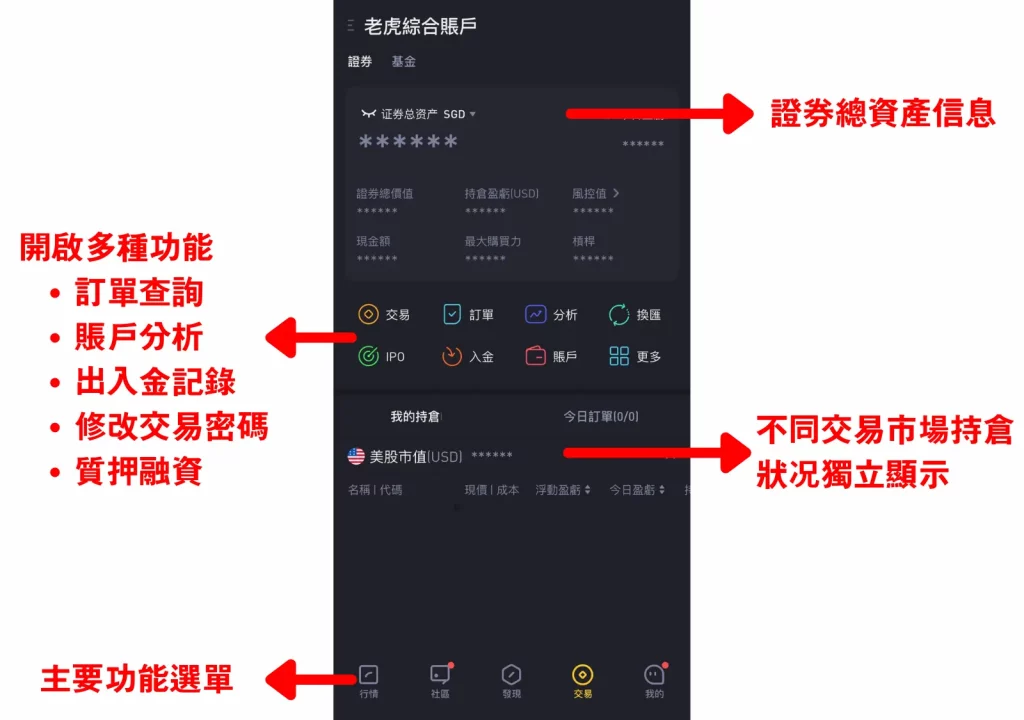
Tiger Securities Order Process
The process for Tiger Securities to place an order to buy and sell stocks and ETFs is simple.
1.Registering an account and remittance deposit 2.Click on the underlying you want to buy or sell, press trade, choose buy / long, or sell / short 3.Set the order information (order type, price, quantity, validity period, before and after the market, etc.) 4.Confirm the order information and send it out.
Next, we will introduce the process of placing an order to buy stocks and ETFs at Tiger Securities step by step in a multi-graphic format.。Order process will be based on Tiger Trade App Traditional Chinese, as long as 1 minute to complete the order transaction。
You can switch to Simplified Chinese or English at any time。
The method is to go to my > upper right corner settings > general > language settings > App display language > select the desired language, click save。
Step 1: Select the target you want to place an order for ♥
Log in to Tiger Trade App personal account, the default main interface is the user's self-selected stock order and the latest quote。In the search bar at the top right of the interface, enter the name or code of a stock, ETF, or other investment product。For example, Tesla stock Tesla (code TSLA), tracking NASDAQ-100 Invesco QQQ Trust (code: QQQ)。
For example: place an order for Apple stock (code AAPL), enter AAPL in the search bar, will automatically pop up the relevant investment products, user posts, company encyclopedia, etc.。Click on Apple stock to enter the underlying detailed market page。
If you have a target that you want to track, you can also click on the right to join the self-selection list.。
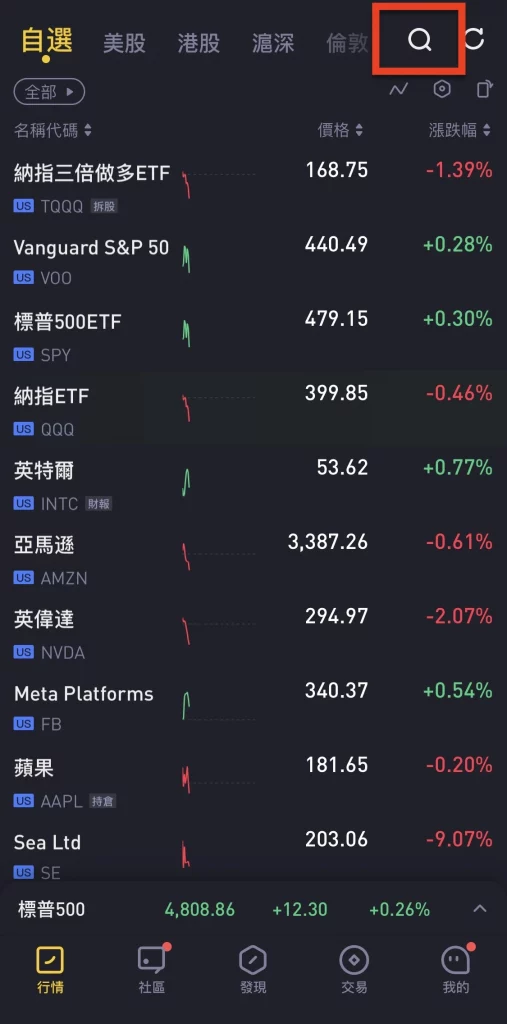
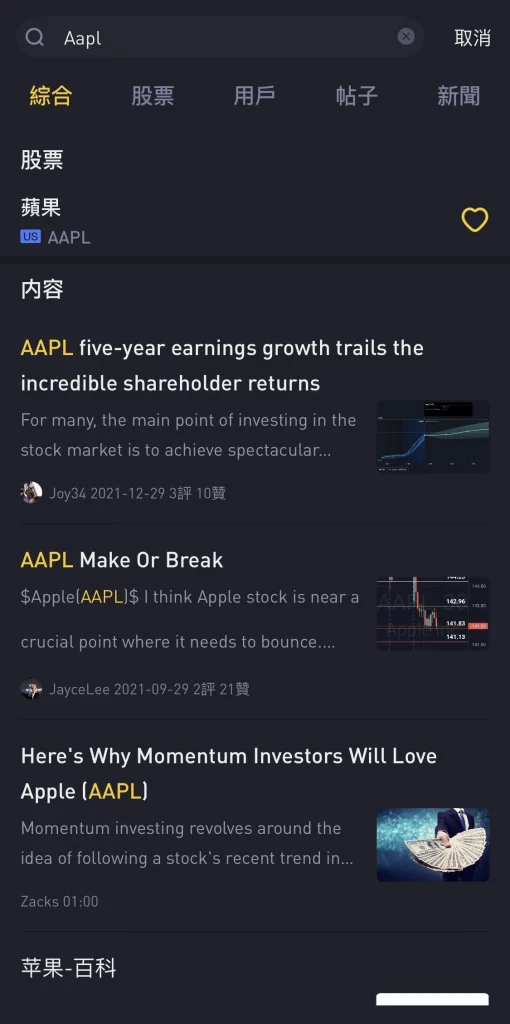
Step 2: Choose the trading direction "Buy" or "Sell"
In the "Quotes" page of the investment target, you can check the market content of the target, including the latest quotes, buying and selling quotes and orders, stock price trends, individual stock information, chip distribution, capital flow analysis, option chain, the latest trends and news, user post sharing, shorting data analysis, financial information, etc.。
Tiger Securities provides free U.S. Stock Level 2 real-time quotes, you can see the second largest U.S. electronic stock exchange NYSE ArcaBook up to 40 buy and sell quotes, as well as the volume of different transaction prices, in order to more accurate bidding.。
In the toolbar at the bottom of the page, click "Trade" and choose the direction to trade: Buy / Long, or Sell / Short。If you want to close a position or trade options, you can also choose here.。
Remind everyone, in the absence of holding the underlying assets, choose to sell on behalf of margin trading, that is, short the stock, first and Tiger Securities to borrow stock trading, the contract expires and then buy back the stock, back to the tiger, from the high sell low buy to earn the difference。
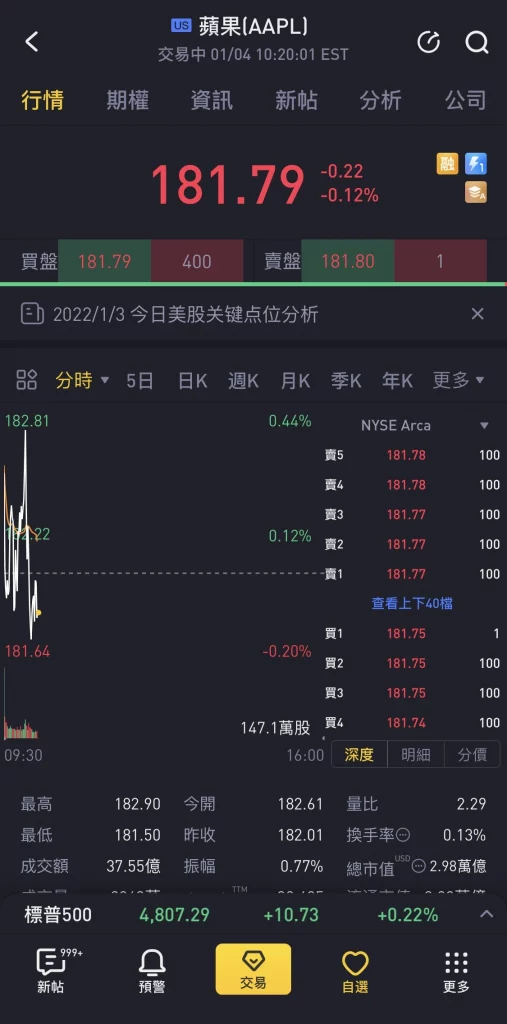
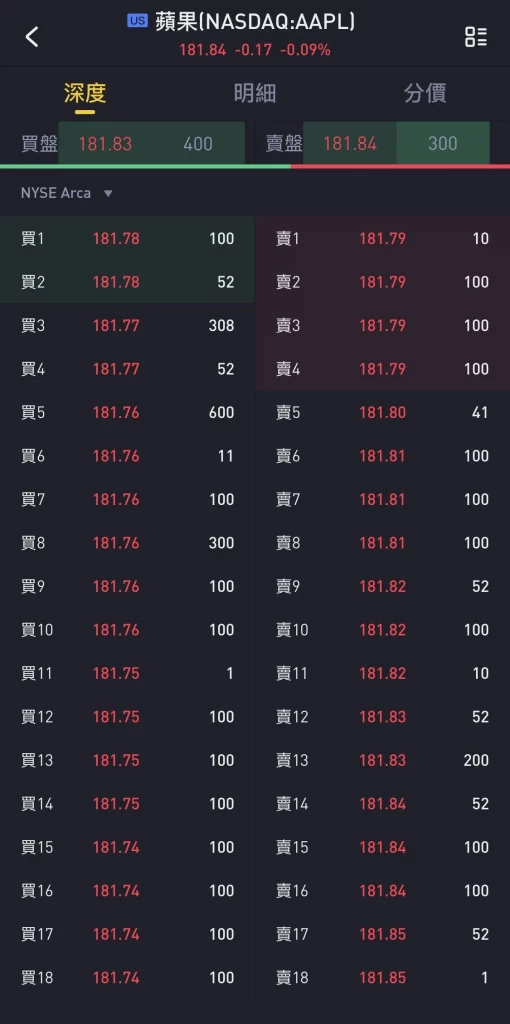
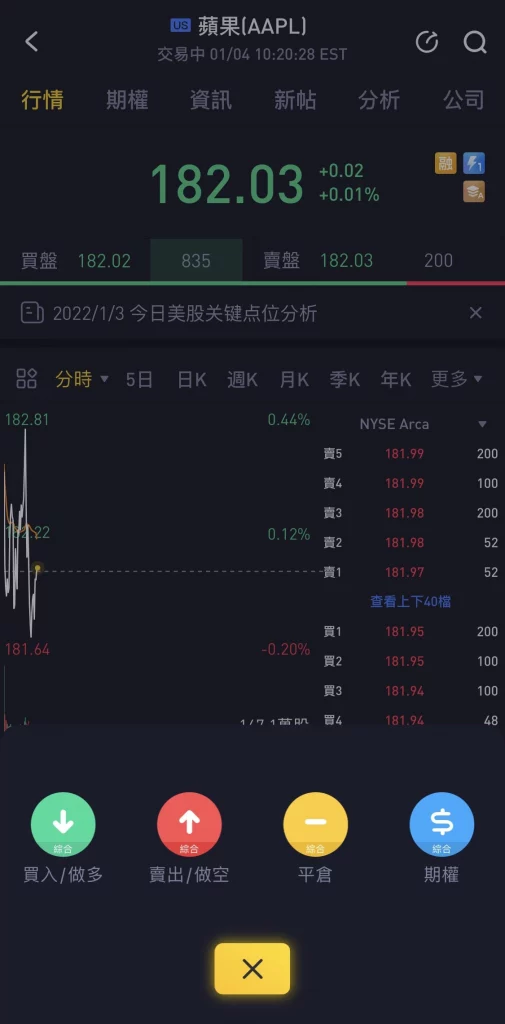
Step 3: Set up the order information (order type, price, quantity, validity period, before and after the plate)
Before setting up the order information, and everyone to introduce the trade order settings, including order type, price, quantity, validity period, before and after the market.。
After setting the order type, price, quantity, expiration date, and whether to allow pre-market trading, click "Buy Order" or "Sell Order"。
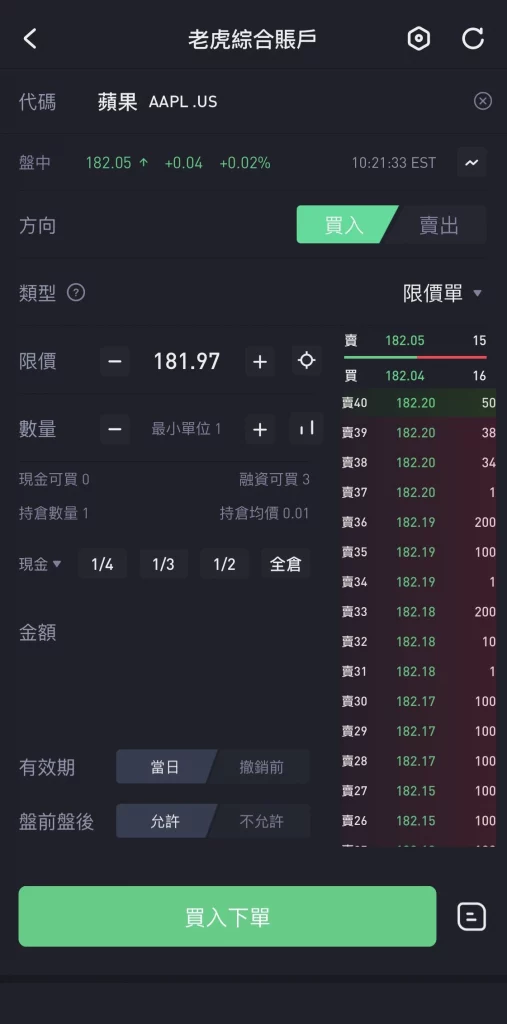
Order Type
Tiger Securities offers 6 types of orders, including limit orders, market orders, stop orders, stop limit orders, conditional orders, and additional orders.。The next section will detail the differences between these 6 orders.。
Price
If you want to buy or sell the underlying at what price, you must set a limit (or trigger price) if you choose an order type that is not a market order, such as a limit order or a stop order.。
Quantity
The number of units to buy or sell, the minimum unit for U.S. stocks is 1, and the minimum unit for Hong Kong stocks is not necessarily (there are 100 shares, 400 shares, depending on the underlying)。
Based on the cash held in the account and the amount of financing available (margin), the system will recommend the amount of money that can be operated on this transaction.。If a financing transaction is used, the system will alert you to the amount of borrowing that will be generated by the transaction。Financing transactions are subject to interest payments, generally not exceeding 0.018%。
Validity
At the time of pending orders (non-market orders), you can select the validity period of the order, including valid on the same day and valid before withdrawal.。
Front disc, rear disc
The U.S. market has a pre-market and after-market trading mechanism that allows investors to trade outside of ordinary trading hours.。
Step 4: Confirm the order information and open the transaction
Check the order details, confirm all the information, click "confirm" to complete the order。
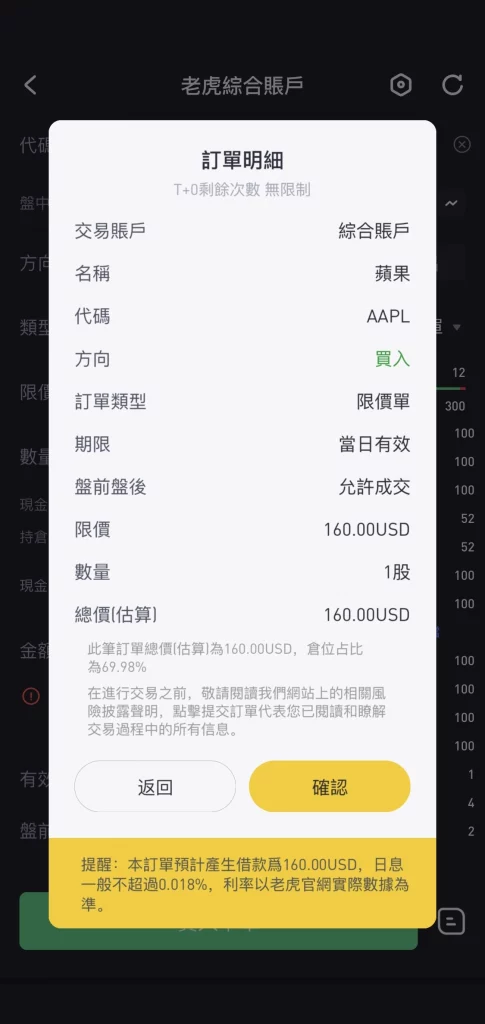
Tiger Securities Order Type
Tiger Securities supports 6 order types, each of which is collated below to illustrate the differences between different orders。
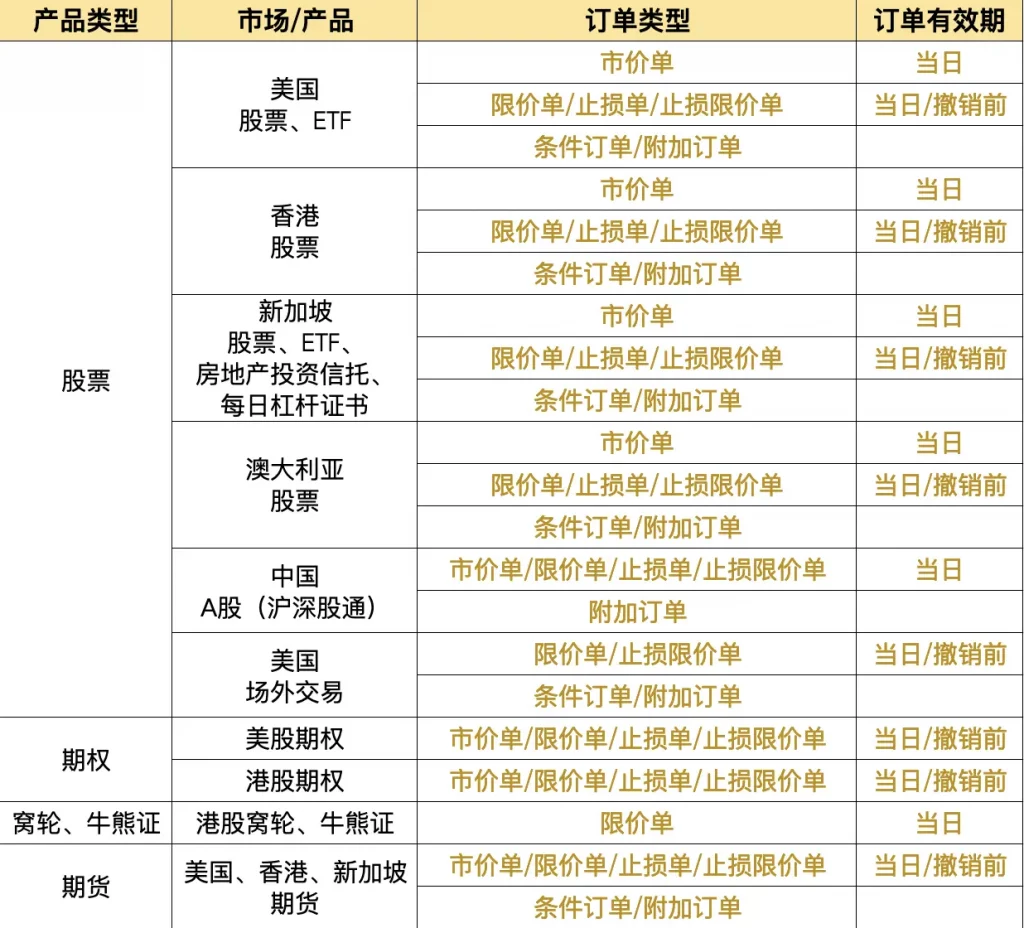
--Source: Tiger Securities official website
Limit Order
A limit order (Limit Order) is an order to buy and sell at a specific price.。Orders are executed and closed only in two cases:
When the specified price is reached, or when a better price is reached (lower than the specified bid price, or higher than the specified ask price)
Advantages: You can lock in the presentation price range and even trade at a better price, i.e. buy at a lower price or sell at a higher price.。
Note: If the price has not reached the specified price, the order will not be executed。Therefore, this order may not be able to close, and miss the investment market.。
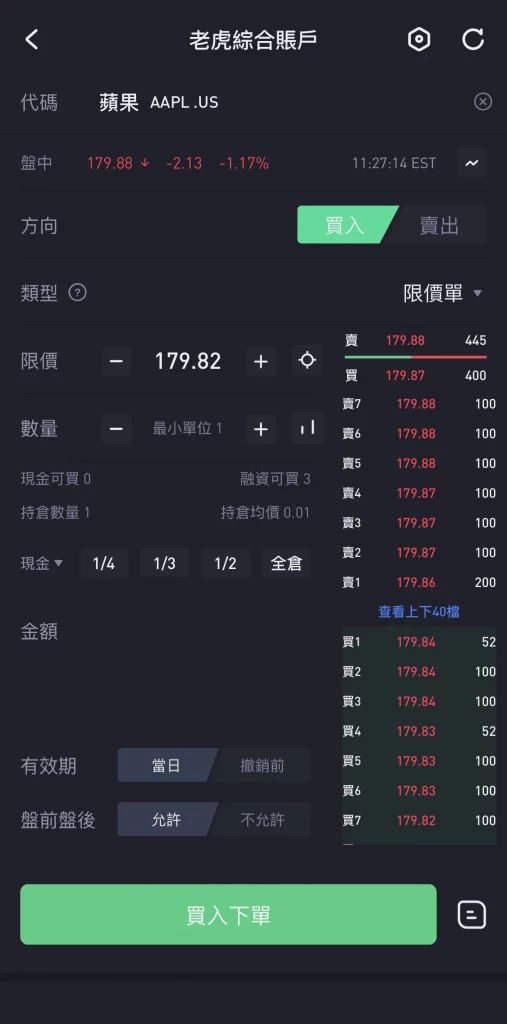
Market Order
Market Order (Market Order) is the current market price to place an order to buy and sell, do not need to set their own price, decide the number of transactions can be。
Advantages: can be the fastest speed to close orders, to seize market opportunities, stop loss or take profit purpose。
Note: Market orders can only be placed at the opening of the stock market.。And a market order guarantees a deal, but not a deal price。Simply put, the price of the transaction fluctuates with the market and may be executed at a higher or lower price。
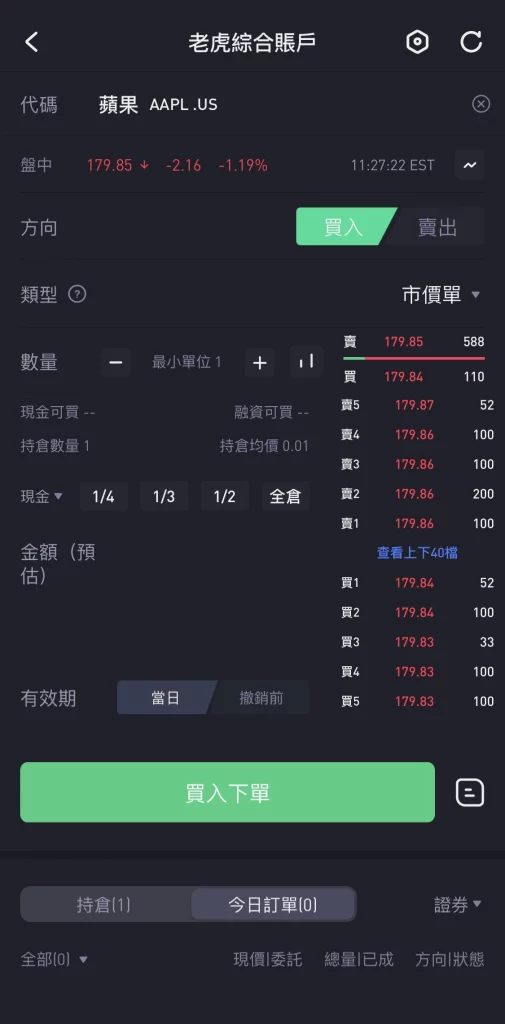
Stop Order
Stop Order (Stop Order) refers to setting a specified stop-loss trigger price (Stop Price) in the order, when the stock price reaches the trigger price, the system automatically submits a buy or sell market order.。
Advantages: Set the target price of stop loss in advance, can control the degree of loss, protect the principal。
Note: Setting a stop-loss order does not guarantee 100% success in placing an order and closing a deal, and will be affected by factors such as insufficient purchasing power and insufficient positions, resulting in failure to trigger an order.。And there is no guarantee that the system's orders will be sold on the same day, because, like ordinary orders, it depends on the market's buying and selling orders.。If there is no transaction on the same day, the order will be cancelled.。
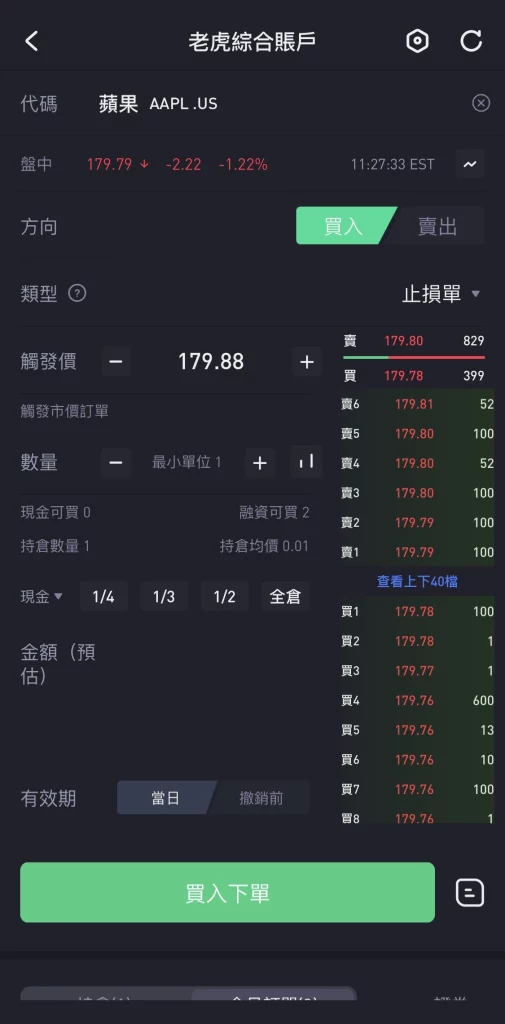
Stop Limit Order
Stop Limit Order (Stop Limit Order) refers to the setting of a specified stop-loss trigger price (Stop Price) and Limit Price (Limit Price) in the order, when the stock price reaches the trigger price, the system automatically submits a buy or sell limit order.。
The biggest difference between a stop-loss limit order and a stop-loss order is the addition of the "limit" part.。Stop orders will be in the form of market orders, so that the order as quickly as possible, but does not guarantee the transaction price;
A stop-loss limit order, on the other hand, will use a limit order as a pending order to guarantee the closing price, but does not guarantee that the order will be closed.。
Advantages: to limit orders, you can avoid the transaction price and the expected price has too much difference。
Note: When placing a buy order, the limit price (Limit Price) should be greater than the trigger price (Stop Price); when selling, the trigger price (Stop Price) should be less than the limit price (Limit Price) to avoid rapid price declines leading to widening losses。
For example, if you buy stock A for $100 and want to keep your maximum loss at 10%, you can make the next stop-loss limit order to sell, with a trigger price (Stop Price) of $91 and a limit price (Limit Price) of $90.。
When the stock price drops to $91, the system automatically submits a sell order with a limit of $90 (selling shares of Company A at $90)。When the stock price drops to $90, this sell order has a chance to close。
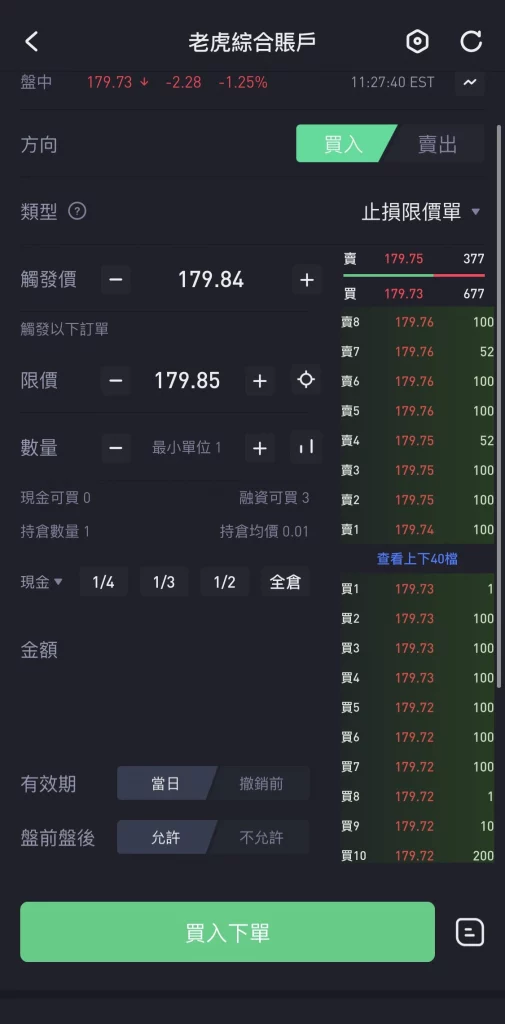
Conditional Order
Conditional Order (Conditional Order) needs to meet several trigger conditions at the same time, such as stock price trend, trigger price (Stop Price), limit price (Limit Price), etc., the system will automatically submit a buy or sell limit order or market price order.。
Users can modify and cancel orders at any time。If the trigger condition has not been met, you can also modify the trigger condition。
Simply put, the condition sheet is a more flexible limit order, and the ability to specify the trend of the stock price "up" or "down" to submit a limit order.。
Advantages: suitable for operation when the market is stable, want to set the trade take profit and stop loss point, can use conditional order operation。
Note: Conditional orders will only be triggered during the session, and stock price fluctuations before and after the session will not affect the trigger conditions.。
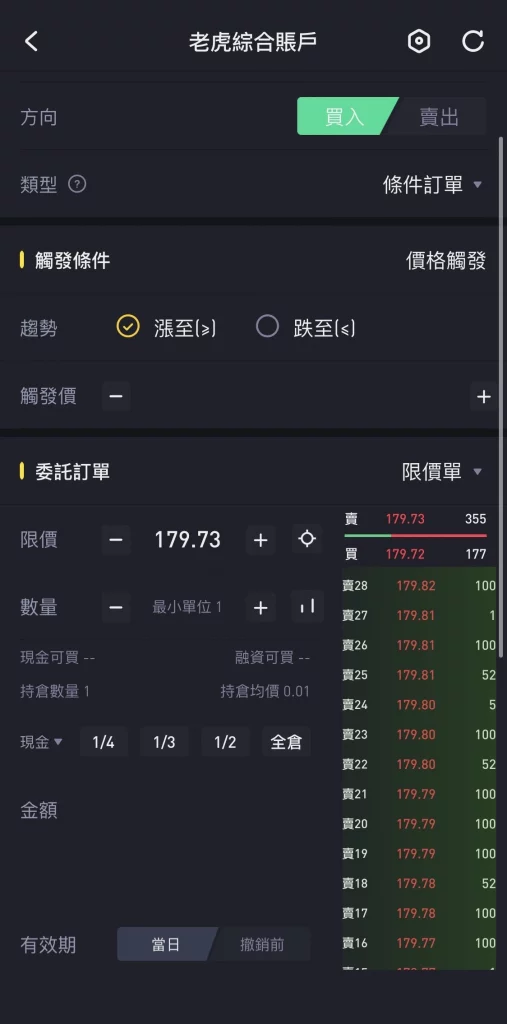
Additional Order
Additional Order (Additional Order) is in addition to the main order, plus a sub-order, can be a limit order (take profit use), stop loss order (stop loss limit order / stop loss order, stop loss use), to achieve the effect of the master order take profit or stop loss.。
Advantages: to take profit and stop loss operations
Note: At present, additional orders do not support pre-market trading hours, the main order can only be attached to a sub-order, when the main order is withdrawn, the associated sub-order will also be withdrawn.。Of course, it is also possible to cancel only sub-orders。
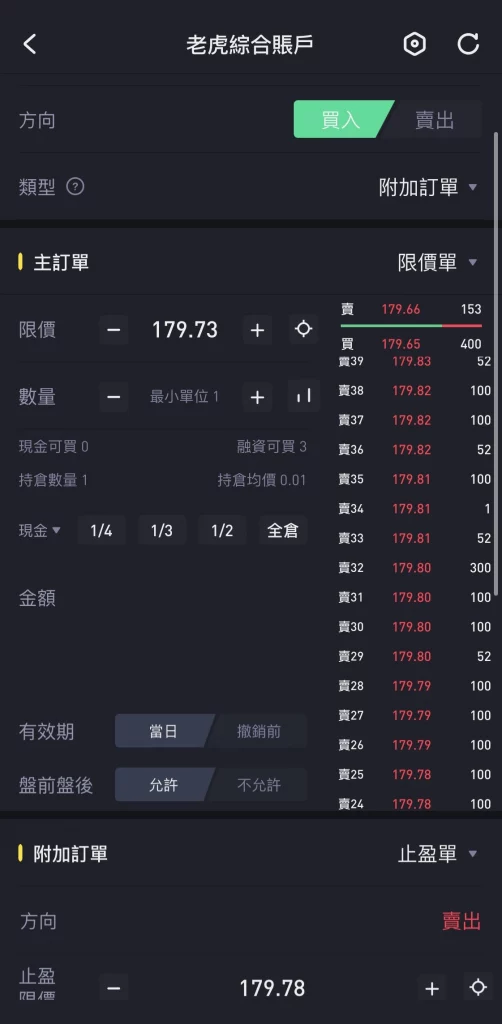
Tiger Securities Order Effective Period
Like most brokerages, Tiger Securities offers two types of order validity (Time in force), which are valid on the same day and valid before cancellation.。
Valid For The Day
Day valid orders (Day) are only valid during the stock market trading session on the day the order is placed, and unfilled orders are automatically withdrawn by the system after the close of the day.。
Good Till Canceled
Good Till Canceled (GTC) will remain valid until the order is closed or manually cancelled。
Tiger Securities supports pre-market after-market trading
Pre-market and post-market is a special trading mechanism for U.S. stocks, while Tiger Securities supports pre-market and post-market trading, allowing investors to trade outside of ordinary trading hours.。
The trading sessions are as follows:
Pre-market trading
◇ 4: 00 ~ 9: 30 Eastern Time
◇ Daylight saving time Malaysia time 16: 00 ~ 21: 30
◇ Malaysia time in winter from 17: 00 to 22: 30
After-hours trading
◇ 16: 00 ~ 20: 00 Eastern Time
◇ Daylight saving time Malaysia time 4: 00 ~ 8: 00
◇ Malaysia time 5: 00 ~ 9: 00 in winter
Account holding different currencies, how to trade different overseas markets?
As mentioned earlier, users can hold multi-currency assets in Tiger Securities, such as USD, HKD, SGD, RMB and AUD.。
When placing an order, the securities account must hold the corresponding currency assets, such as trading U.S. stocks, must hold U.S. dollars;。
If the account does not hold the currency asset and wants to invest in other markets, there are two ways.
◇ Use the built-in currency exchange function
◇ Use the financing transaction first, then exchange the foreign exchange to return the loan to Tiger Securities.
Use the built-in currency exchange feature
For example, if you want to invest in U.S. stocks, you can use the currency exchange function built into Tiger Securities to transfer the new dollar to the U.S. dollar.。
The method is to go to "transaction," in the middle of the function column, choose "exchange," set the currency and amount to be transferred。
The system will show what the current exchange rate is and what the maximum convertible cash is.。The time required for general exchange is T + 2, which takes about 2 to 3 working days to process。
After the exchange is completed, Tiger Securities will be notified via app push and email.。
Attention should be paid when exchanging foreign exchange:
◇ Only cash assets can be exchanged for currency, and the maximum amount of convertibility is based on how much cash is held in the account.。
The currencies supported by Tiger Securities include: Singapore dollar, US dollar, Hong Kong dollar, RMB, Australian dollar, New Zealand dollar, euro, British pound, Japanese yen.。
◇ The exchange rate for currency exchange is subject to real-time changes and is based on the actual transaction rate.。
Currency exchange time: 06: 20 to 04: 55 (Singapore time)。Note that currency conversion is not supported between 12: 00 and 13: 00 due to system settlement requirements。
Tiger Securities does not charge currency exchange fees.。
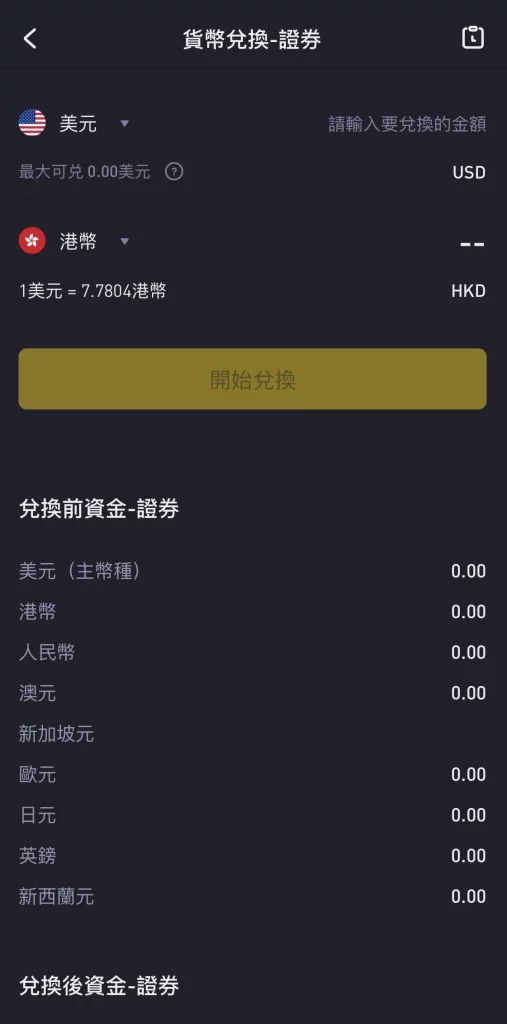
Use of financing transactions
Because the exchange needs T + 2 processing, if you don't want to miss the investment opportunity, you can also use the financing transaction (margin) first, and then exchange the loan back to Tiger Securities.。
For example, if you have S $10,000 in cash in your account and haven't exchanged it for U.S. dollars, you can use the S $10,000 cash to buy U.S. stocks in a financing transaction, and then transfer the S $10,000 cash to U.S. dollars and return it to Tiger Securities.。
When placing an order, if the account does not hold cash, it will automatically be financed。This loan will incur interest, which generally does not exceed 0 per day..018%。
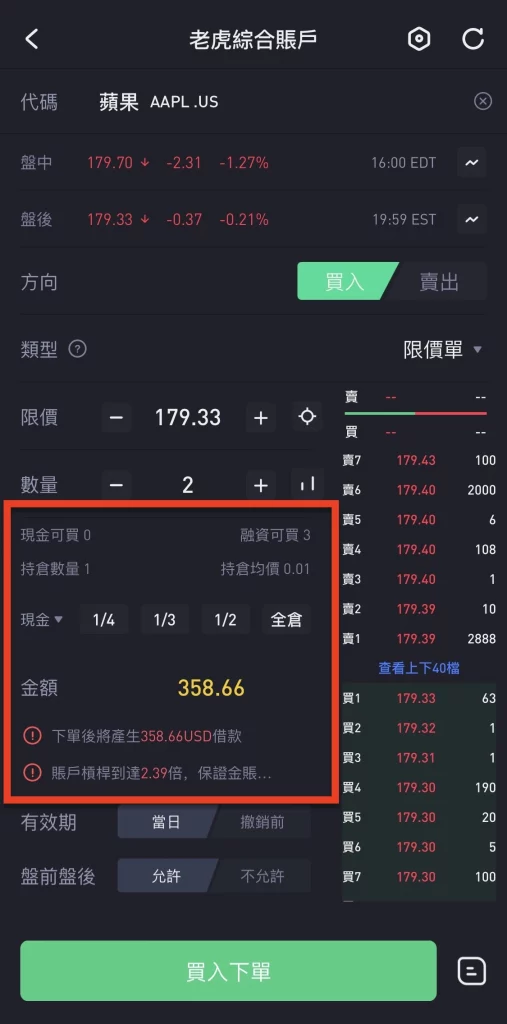
SUMMARY
These are Tiger Securities orders to buy and sell stocks, as well as the currency exchange process.。At the time of the transaction, cash or financing transactions may be used。It is important to note that financing transactions generate daily interest and there is also the risk of leverage, so be careful before investing。
Any questions, welcome to leave a message to communicate with us。
Disclaimer: The views in this article are from the original Creator and do not represent the views or position of Hawk Insight. The content of the article is for reference, communication and learning only, and does not constitute investment advice. If it involves copyright issues, please contact us for deletion.